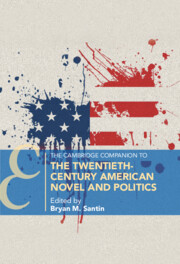Book contents
- The Cambridge Companion to the Twentieth-Century American Novel and Politics
- The Cambridge Companion to the Twentieth-Century American Novel and Politics
- Copyright page
- Dedication
- Contents
- Chronology
- Introduction
- Part I Ideologies and Movements
- Chapter 1 Progressive Liberalism
- Chapter 2 Conservatism
- Chapter 3 Neoliberalism
- Chapter 4 Socialism and Communism
- Chapter 5 Feminisms
- Chapter 6 Sexual Liberation Movements
- Chapter 7 Black Liberation Movements
- Part II The Politics of Genre and Form
- Part III Case Studies
- Further Reading
- Index
- Cambridge Companions To …
Chapter 2 - Conservatism
from Part I - Ideologies and Movements
Published online by Cambridge University Press: 07 October 2023
- The Cambridge Companion to the Twentieth-Century American Novel and Politics
- The Cambridge Companion to the Twentieth-Century American Novel and Politics
- Copyright page
- Dedication
- Contents
- Chronology
- Introduction
- Part I Ideologies and Movements
- Chapter 1 Progressive Liberalism
- Chapter 2 Conservatism
- Chapter 3 Neoliberalism
- Chapter 4 Socialism and Communism
- Chapter 5 Feminisms
- Chapter 6 Sexual Liberation Movements
- Chapter 7 Black Liberation Movements
- Part II The Politics of Genre and Form
- Part III Case Studies
- Further Reading
- Index
- Cambridge Companions To …
Summary
This chapter sketches the history of movement conservatism’s impact on American literature from the 1950s to the present. Midcentury conservatives, in their war against an intelligentsia that they perceived as dominated by liberal voices, evolved a model of counter-expertise that continues to inform right-wing intellectual practice today. This model was influenced by midcentury disciplinary conflicts between literature and the social sciences, with conservatives affirming a literary model of truth against the rationalism of social scientific discourse. Focusing on writers who published in the book review section of National Review, this chapter shows how the idea of conservative counter-expertise attracted critics and fiction writers such as Joan Didion, Hugh Kenner, Guy Davenport, and Garry Wills. However, the conservative critique of the liberal intelligentsia was in the process of turning into a critique of expertise as such; this critique pushed many of these writers away from the magazine and helped fashion the version of the left/eight divide that defines American politics today.
Keywords
- Type
- Chapter
- Information
- Publisher: Cambridge University PressPrint publication year: 2023

